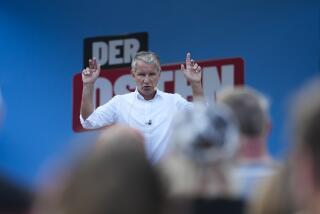Washington Viewing East German Vote With Elation--and Trepidation : Unification: The formal response is bland. But privately, the conservative victory is hailed. Major question arises over a new Germany’s ties to NATO.
WASHINGTON — The Bush Administration watched East Germany’s elections on Sunday with a mixture of elation and apprehension: elation over the clear mandate the conservative landslide gave to unification with the West, combined with nagging worries over the pitfalls that may lie ahead.
Publicly, the Administration’s reaction was diplomatically bland. “The United States welcomes today’s parliamentary elections in the German Democratic Republic,” White House spokeswoman Alixe Glen said. “We have long supported the aspirations of the people of East Germany to decide their own future through a freely elected parliament and government. We join them and the people of the Federal Republic of Germany in celebrating this historic occasion.”
But in private, Administration officials were delighted by the victory of the conservative Alliance for Germany, which campaigned on a platform of immediate unification with West Germany.
More central to the Administration’s immediate concerns, the conservative parties have largely followed the lead of their West German patron, Chancellor Helmut Kohl, in insisting that a new, reunified Germany remain a full member of the North Atlantic Treaty Organization with the United States.
The issue was not a major point in the East German campaign, which focused on the pace of reunification and its economic and social consequences for 16 million people who have lived under Communist rule for almost 45 years.
But it had been Washington’s main preoccupation, especially since the Soviet Union began arguing last month that a unified Germany should withdraw from NATO. The conservatives’ main rival in both East and West Germany, the Social Democratic Party, has waffled on the issue--and that made U.S. officials nervous about their chances of victory in Sunday’s election.
Asked in a television interview last week what the election meant for U.S. foreign policy, Vice President Dan Quayle went straight to the issue of Germany’s alignment with the West. “The important thing is to remind ourselves that a reunited Germany must not be neutral,” Quayle said. “It must be aligned with NATO.”
Now, officials said, the Bush Administration hopes the new East German Parliament will form a coalition of several parties--including both the conservatives and Social Democrats, but not the former Communists--that can convince the population that reunification is coming and help stabilize the process of merging the country’s two halves.
In practice, they said, that means slowing the flood of East German emigrants to West Germany long enough to give the two governments a chance to work out a process for the concrete details of unification.
The Administration also hopes the headlong pace of unification can be slowed down--at least slightly--to minimize the chances of alarming the Soviet Union and Germany’s other neighbors, who have already shown themselves to be worried about the sudden, uncontrolled emergence of a powerful new nation in their midst.
But officials are not convinced that the process can be controlled very well.
“A lot of people are saying that the mood has changed, that it isn’t going to go so fast after all,” one Administration analyst said. “But the objective facts are still there. The emigrants are still coming across. Their sense that they’ve wasted a life and want the benefits that are waiting for them (in the West) is certainly still very strong. . . . What is so magic about election day to slow them down?”
Meanwhile, the international talks on Germany’s unification are being held “virtually round the clock,” he said. The talks are commonly known as “two plus four” because they join the two Germanys plus the top World War II victors--the United States, the Soviet Union, France and Britain.
More to Read
Get the L.A. Times Politics newsletter
Deeply reported insights into legislation, politics and policy from Sacramento, Washington and beyond. In your inbox three times per week.
You may occasionally receive promotional content from the Los Angeles Times.











